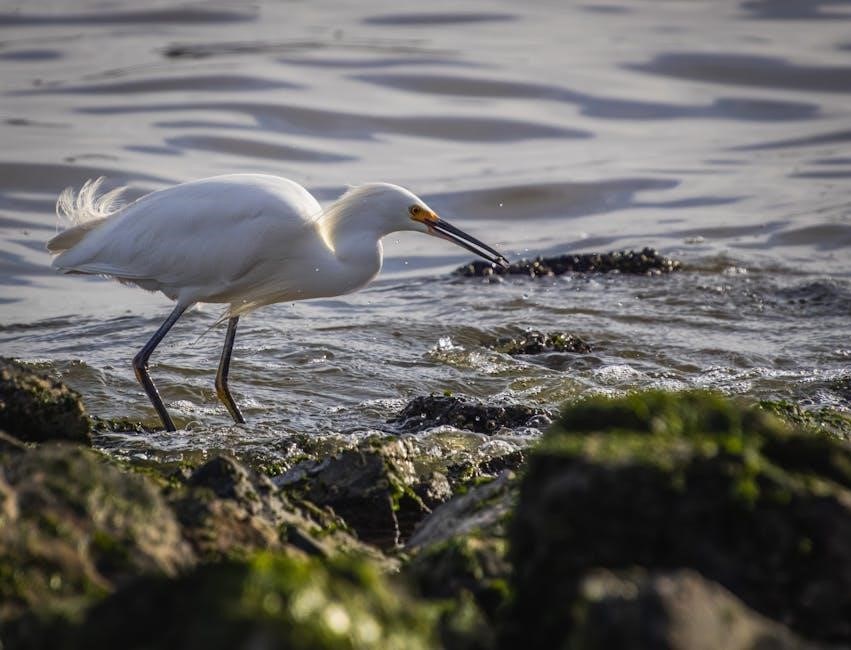Sea duck hunting guides are experts who specialize in planning and executing successful waterfowl hunting trips, ensuring a safe and memorable experience for hunters of all skill levels.
1.1 Overview of Sea Duck Hunting
Sea duck hunting is a specialized form of waterfowl hunting, targeting species like mergansers, eiders, and scoters. It often occurs in coastal areas with challenging conditions, requiring specific strategies and equipment. Hunters use decoys, calls, and concealment to attract these ducks, which are known for their unique behaviors and habitats. The sport demands skill, knowledge, and adaptability, making it a thrilling yet rewarding experience for enthusiasts.
1.2 Importance of Guides in Sea Duck Hunting
Sea duck hunting guides are crucial for a successful and safe experience. They offer expert knowledge of coastal habitats, migration patterns, and legal requirements. Guides provide strategic insights, ensuring hunters maximize their chances of success while adhering to regulations. Their expertise enhances the overall quality and safety of the hunting trip, making them indispensable for both novice and experienced hunters.
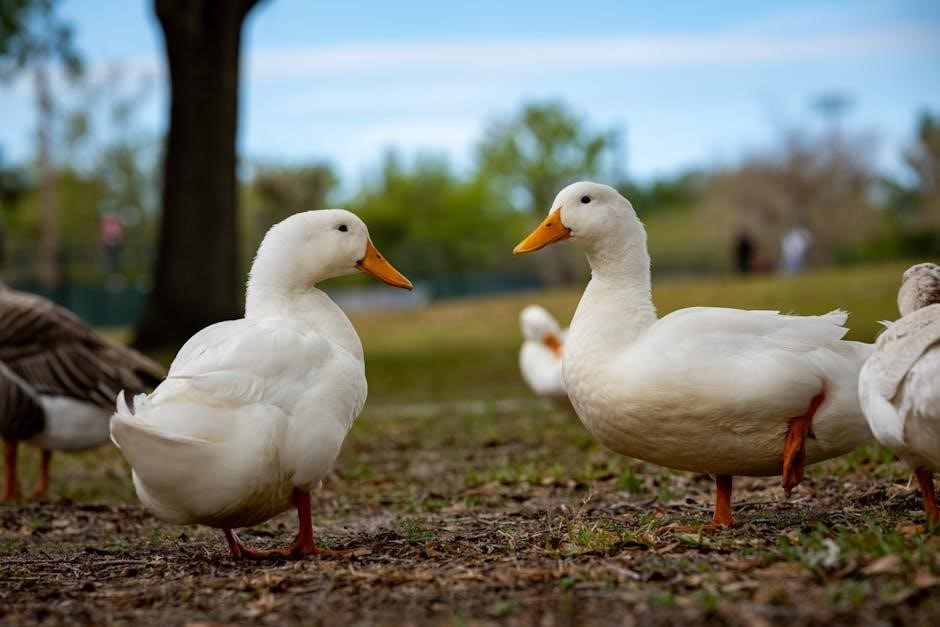
Best Locations for Sea Duck Hunting
Prime locations for sea duck hunting include coastal wetlands, estuaries, and islands, offering abundant food sources and ideal habitats for various species during migration seasons.
2.1 Coastal Areas and Migration Patterns
Coastal areas are prime spots for sea duck hunting, as these birds often migrate along specific corridors. Key stopover points include bays, estuaries, and islands, where ducks rest and feed. Understanding migration patterns helps hunters identify peak seasons and locations. Tidal movements and food availability significantly influence their movements, making coastal regions ideal for targeting species like scoters and eiders during their journeys.
2.2 Key Regions for Sea Duck Hunting in North America
North America offers exceptional sea duck hunting opportunities, with prime locations along the East Coast, Gulf Coast, and West Coast. Regions like Chesapeake Bay, Cape Cod, and Louisiana’s marshlands are renowned for abundant species. The Pacific Northwest, including Puget Sound and San Francisco Bay, also attracts hunters. Alaska’s vast coastal areas provide ideal habitats for sea ducks, making these regions highly sought after by hunters.
2.3 International Hotspots for Sea Duck Hunting
International hotspots for sea duck hunting include the United Kingdom, Scandinavia, and parts of Europe. Locations like the Outer Hebrides and Shetland Islands in the UK are favored for their diverse species. Scandinavia offers prime hunting grounds in Norway and Sweden, while the Baltic States and Denmark’s Wadden Sea also attract hunters. These regions boast rich migration patterns and abundant sea duck populations, making them global destinations for enthusiasts.
Legal and Regulatory Considerations
Understanding legal requirements is crucial for sea duck hunting. Obtain necessary permits and licenses, ensuring compliance with federal and local regulations to promote sustainable practices.
3.1 Licenses and Permits Required
Sea duck hunting requires specific licenses and permits, including a valid waterfowl hunting license and federal duck stamp. Additional permits may be needed for certain species or hunting methods. Ensure compliance with local, state, and federal regulations, as requirements vary by region. Guides often assist clients in obtaining necessary documentation, ensuring legal and ethical hunting practices.
3.2 Bag Limits and Seasonal Restrictions
Bag limits regulate the number of sea ducks hunters can harvest daily, ensuring sustainable populations. Seasonal restrictions dictate when hunting is allowed, protecting vulnerable periods like breeding and migration. Limits and seasons vary by region and species. Guides help navigate these regulations, ensuring legal hunting practices. Compliance is essential for maintaining healthy ecosystems and hunting privileges.
3.4 Compliance with Local and Federal Regulations
Local and federal regulations ensure ethical and sustainable sea duck hunting practices. Guides help hunters understand and adhere to laws, including permits, gear standards, and environmental protections. Compliance is crucial for preserving habitats, maintaining wild populations, and promoting fair hunting practices. Adhering to regulations fosters a balance between hunting and conservation, ensuring the sport remains viable for future generations.
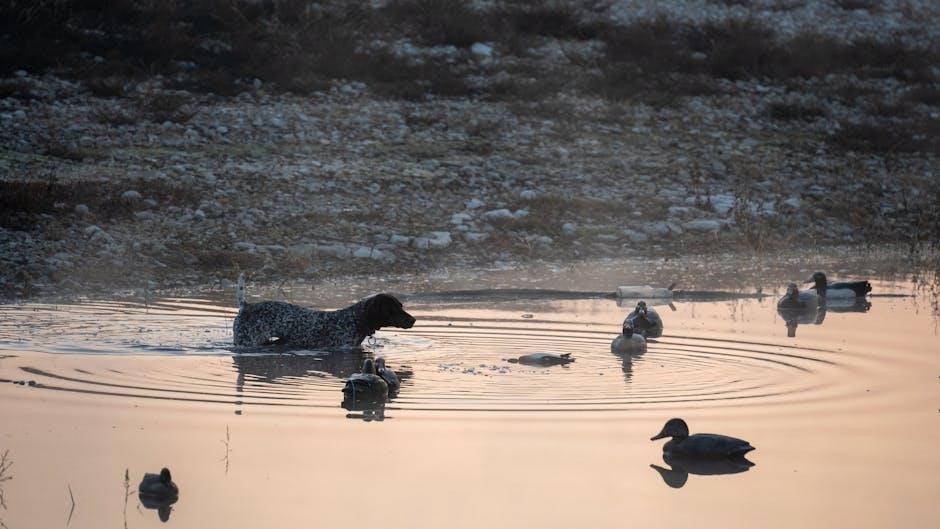
Essential Gear for Sea Duck Hunting
Shotguns, ammunition, decoys, and calls are vital for sea duck hunting. Durable waders, layered clothing, and safety gear ensure hunters remain protected in harsh coastal environments.
4.1 Shotguns and Ammunition Choices
For sea duck hunting, semi-automatic and pump-action shotguns are preferred for reliability in wet conditions. A 12-gauge shotgun with a 3 or 3.5-inch chamber is ideal. Steel shot is mandatory for waterfowl, with sizes ranging from BB to T for effective range and penetration. Choosing the right shotgun and ammunition ensures ethical and successful hunting.
4.2 Decoys and Calls for Sea Ducks
Using species-specific decoys and realistic calls is crucial for attracting sea ducks. Durable decoys designed for marine environments are essential, as they withstand rough waters. Callers must mimic the unique sounds of sea ducks to lure them effectively. A well-placed decoy spread and skilled calling can significantly improve hunting success, making these tools indispensable for sea duck hunters.
4.3 Waders, Clothing, and Safety Gear
Waders and waterproof clothing are essential for sea duck hunting, protecting hunters from harsh marine conditions. Insulated, breathable gear helps maintain warmth and dryness. Safety gear, including life jackets and communication devices, is critical for emergencies. Durable, layered clothing and proper footwear ensure comfort and mobility in challenging environments, making them vital for a successful and safe hunting experience.
Effective Hunting Strategies
Effective strategies involve understanding duck behavior, using decoys, and mastering calls. Adaptability to weather and terrain is key, ensuring a successful and rewarding hunting experience always.
5.1 Setting Up Decoy Spreads
Setting up decoy spreads requires strategic placement to mimic natural feeding or resting patterns. Guides often use a mix of species-specific decoys, arranging them in open water or shoreline areas. Movement and realism are key, with decoys rigged to sway naturally in currents. This setup attracts sea ducks effectively, ensuring a convincing and irresistible presentation for hunters.
5.2 Using Calls to Attract Sea Ducks
Using calls to attract sea ducks is crucial for a successful hunt. Guides use high-quality calls that mimic the sounds of various species. Timing and rhythm are essential to create realistic communication. This technique, combined with decoys, enhances the chances of luring ducks within shooting range, ensuring an effective and engaging hunting experience.
5.3 Concealment Techniques and Blind Setup
Concealment is vital for sea duck hunting success. Guides use natural materials and camouflage to blend hunters into the environment. Blind setups, such as layout boats or shore hides, are strategically positioned to remain undetected. Proper concealment ensures ducks approach confidently, increasing the likelihood of a successful hunt while maintaining a safe and effective shooting position for all participants.
Conservation and Ethical Practices
Conservation and ethical practices are cornerstone principles in sea duck hunting. Guides emphasize sustainable hunting methods, ensuring balanced ecosystems while promoting responsible and respectful interactions with wildlife and habitats.
6.1 Sustainable Hunting Practices
Sustainable hunting practices ensure the long-term health of sea duck populations. Guides emphasize adherence to bag limits, responsible harvesting, and avoidance of vulnerable species. By educating hunters on ethical practices, guides help maintain ecological balance while promoting the sport’s future. Key strategies include avoiding sensitive habitats, using non-toxic ammunition, and ensuring humane harvesting methods to preserve both the environment and wildlife for generations.
6.2 Role of Hunters in Sea Duck Conservation
Hunters play a vital role in sea duck conservation by supporting habitat preservation and reporting harvest data. Their participation in regulated hunting ensures population balance, while adherence to ethical practices protects vulnerable species. Hunters also contribute to conservation efforts by funding programs through licenses and advocating for sustainable practices, making them key stakeholders in maintaining healthy sea duck populations.
Choosing the Right Guide or Outfitter
Choosing the right guide or outfitter is crucial for a successful sea duck hunting experience. Research their reputation, experience, and client reviews. Ensure they offer tailored trips, proper licensing, and prioritize safety. A professional guide enhances your hunt with local knowledge and ethical practices, making your adventure both productive and enjoyable.
7.1 Researching Reputable Guides
Researching reputable guides involves checking reviews, asking for referrals, and verifying their experience and success rates. Look for licensed professionals with extensive knowledge of local regulations and sea duck behavior. Ensure they prioritize safety, ethical practices, and sustainable hunting. A trustworthy guide will enhance your hunting experience and provide valuable insights into effective strategies and techniques.
7.2 What to Expect from a Professional Guide
A professional guide offers expert knowledge of sea duck behavior, habitats, and legal regulations. They provide high-quality equipment, including decoys and calls, and ensure safety through emergency preparedness. Expect clear communication, strategic hunting techniques, and adherence to ethical practices. A reputable guide enhances your hunting experience while promoting responsible and sustainable practices in the field.
Safety Considerations
Safety is paramount in sea duck hunting. Hunters must navigate rough waters, prepare for emergencies, and use proper gear to ensure a secure experience in remote areas.
8.1 Navigating Rough Waters Safely
Navigating rough waters safely requires experienced guides who understand tidal patterns, currents, and weather conditions. Sturdy boats designed for marine environments are essential, along with life jackets and emergency beacons. Monitoring weather forecasts and being prepared for sudden changes ensures a safer hunting experience in challenging coastal conditions.
8.2 Emergency Preparedness in Remote Areas
Emergency preparedness is critical for remote sea duck hunting trips. Guides ensure hunters carry essentials like first aid kits, emergency beacons, and communication devices. Having a plan for unexpected situations, such as bad weather or injuries, is vital. Proper clothing, food, and water supplies are also essential to handle crises effectively in isolated locations.
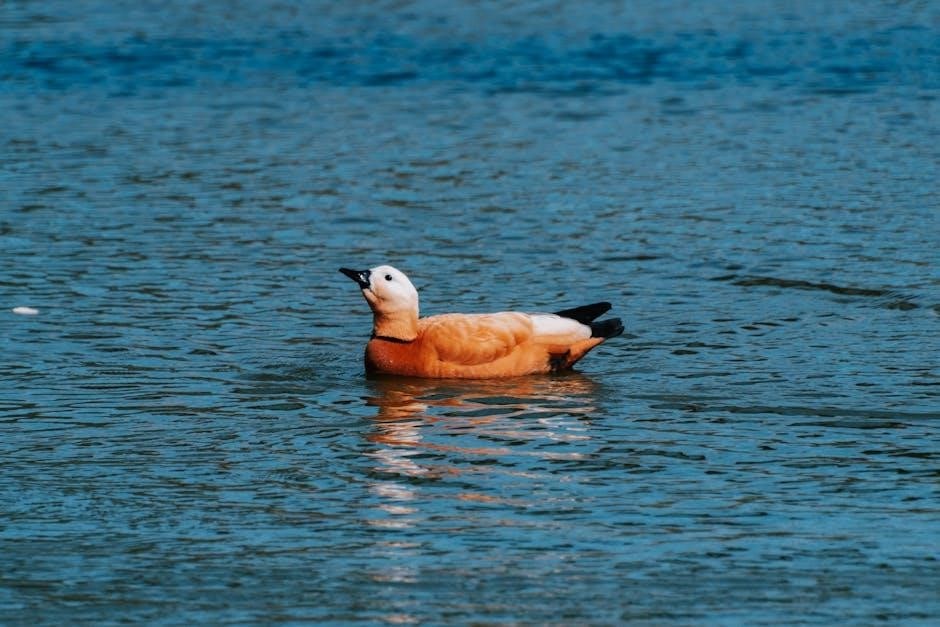
Weather and Environmental Factors
Understanding weather conditions and environmental factors is crucial for sea duck hunting. Guides monitor tides, wind, and water levels to ensure safe and effective hunting experiences.
9.1 Understanding Weather Conditions for Hunting
Weather conditions play a critical role in sea duck hunting. Guides closely monitor wind, tides, and storms, as these factors significantly impact hunting success and safety. Adverse weather can disrupt duck behavior, making it essential to adapt strategies. Understanding these elements ensures hunters can navigate challenging environments effectively, maximizing their chances of a successful and safe hunting experience.
9.2 Adapting to Tides and Water Levels
Sea duck hunting guides must master tidal patterns and water level fluctuations, as these directly influence duck behavior and habitat accessibility. High tides may submerge feeding areas, while low tides expose mudflats, altering hunting strategies. Guides adjust decoy placements and blind setups accordingly, ensuring optimal positioning to capitalize on duck movements. Precision in timing is crucial for success in dynamic coastal environments.
Pre-Hunt Preparation
Pre-hunt preparation involves detailed planning, gear checks, and scouting locations to ensure a successful and safe hunting experience, guided by expert knowledge of sea duck behavior and habitats.
10.1 Scouting Locations and Planning Trips
Scouting locations involves identifying coastal hotspots and migration patterns to pinpoint where sea ducks are most active. Guides use expertise to select optimal spots, ensuring access to prime hunting areas. Planning trips requires checking permits, weather forecasts, and gear readiness. Hunters must adapt to conditions like tides and wind, balancing thorough preparation with flexibility for a successful hunt.
10.2 Physical and Mental Readiness
Physical stamina is crucial for sea duck hunting, as it involves long hours in challenging environments. Hunters should engage in regular exercise to build endurance and strength. Mental readiness is equally important, requiring focus and patience. Practicing mindfulness or visualization can enhance concentration, ensuring hunters stay alert and prepared for the demands of the hunt.
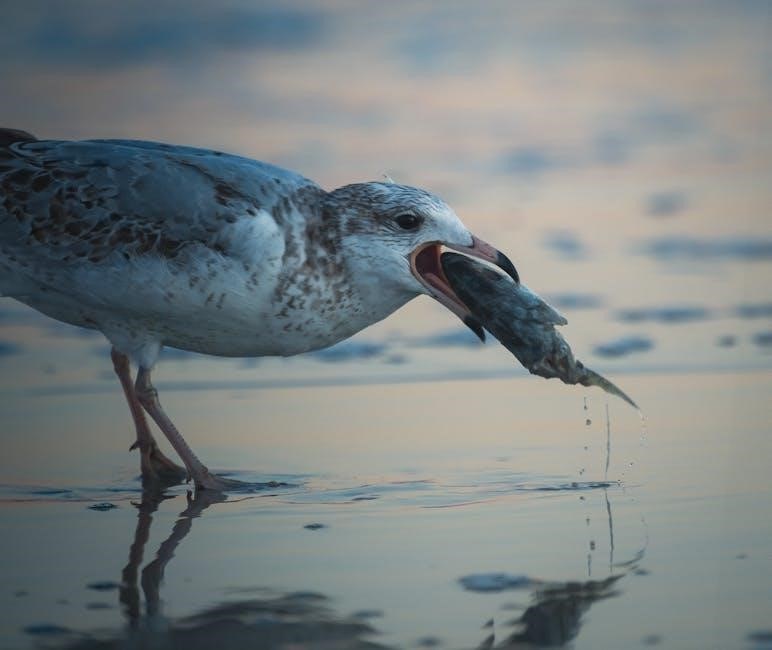
Post-Hunt Procedures
Post-hunt procedures involve field dressing, storing, and transporting harvested ducks. Proper handling ensures meat quality and adherence to regulations, making the process efficient and ethical.
11.1 Field Dressing and Processing Ducks
Field dressing involves carefully cleaning and preparing ducks for storage. Guides often demonstrate proper techniques, ensuring humane handling. Processing includes plucking, eviscerating, and rinsing to maintain quality. Proper storage in clean, cool conditions prevents spoilage. Experienced guides emphasize hygiene and efficiency, making the process swift and respectful to the harvested birds, ensuring safety and quality for consumption.
11.2 Preserving and Cooking Sea Ducks
Preserving sea ducks involves proper freezing or vacuum-sealing to maintain flavor. Cooking methods include roasting, grilling, or pan-searing, often enhanced with marinades. Guides may share recipes, such as herb-roasted ducks or citrus-glazed dishes. Proper handling ensures tender meat, and pairing with complementary flavors highlights the birds’ unique taste, making the culinary experience rewarding after a successful hunt.
Community and Etiquette
Building a strong, respectful community is crucial in sea duck hunting. Hunters should cooperate, respect the environment, and follow ethical practices to ensure sustainable and enjoyable experiences.
12.1 Respecting Other Hunters and the Environment
Respecting other hunters and the environment is essential for maintaining a positive hunting community. Always practice ethical behavior, avoid disturbing others, and dispose of waste properly. Following local regulations ensures the preservation of natural habitats. By fostering a culture of respect, hunters contribute to sustainable hunting practices and protect the environment for future generations.
12.2 Building Relationships in the Hunting Community
Building strong relationships within the hunting community fosters camaraderie and mutual respect. Sharing knowledge, experiences, and best practices creates a supportive environment. Collaborating on planning trips, strategies, and conservation efforts strengthens bonds. Engaging with fellow hunters and guides helps build trust and a sense of belonging, enriching the overall hunting experience and promoting a connected, passionate community.
Sea duck hunting guides provide invaluable expertise, ensuring successful and ethical hunts. Their knowledge of strategies, conservation, and community building fosters a rewarding experience for all hunters.
13.1 Final Tips for Successful Sea Duck Hunting
- Plan thoroughly, considering weather, tides, and bird behavior.
- Invest in quality decoys and calls to attract sea ducks effectively.
- Stay concealed with proper blinds and camouflage.
- Respect bag limits and regulations to ensure sustainable hunting.
- Continuously learn from guides and adapt strategies for better outcomes.
13.2 Encouragement to Join the Hunting Community
Joining the sea duck hunting community offers camaraderie, shared knowledge, and unforgettable experiences. Engage with fellow hunters, learn from experts, and contribute to conservation efforts. Whether you’re a novice or seasoned hunter, the community provides support and inspiration to enhance your hunting journey and foster a deeper connection with nature and tradition.
